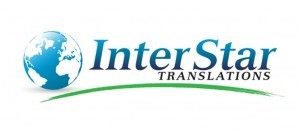 Translation services is a group of language related services provided by a translation agency. In common parlance translation is often confused with interpretation:
Translation services is a group of language related services provided by a translation agency. In common parlance translation is often confused with interpretation:
- translation: professional written language translation services, such as document translation, website or webpage translation, localization services.
- interpretation: working with oral language. This type of professional interpreting services may include simultaneous interpretation, consecutive interpretation, escort interpretation at meetings, conferences, business events etc.
 Translation services can be generic or specialized. Generic services may include professional translation of business documents by a translation company. Specialized translation services may be used for special projects, for example, localization, or to serve dedicated professions or communities, for example, law firms, various professional associations specializing in a particular topic, etc.
Translation services can be generic or specialized. Generic services may include professional translation of business documents by a translation company. Specialized translation services may be used for special projects, for example, localization, or to serve dedicated professions or communities, for example, law firms, various professional associations specializing in a particular topic, etc.
Such translation projects may require certified translators or use of specialized translation software with translation memory and other features.
Project management is another important part of translation services. Tracking document versions, changes made by clients, special terminology that the client wants to use is no easy challenge, especially for technical translations.
Professional translators usually work into their native language from one or more foreign languages. However, in practice, some professional translators work into their foreign language (or “B” language according to the classification of AIIC – the International Association of Conference Interpreters) as well.
 A translator’s foreign language may indeed be very similar in level of mastery of his or her native language. However, quality control standards in translation services require that the draft translation into Russian for example is edited by a separate editor who is a native speaker of Russian and has appropriate training not just as a translator but as an editor of translated work.
A translator’s foreign language may indeed be very similar in level of mastery of his or her native language. However, quality control standards in translation services require that the draft translation into Russian for example is edited by a separate editor who is a native speaker of Russian and has appropriate training not just as a translator but as an editor of translated work.
In particular, such translation editor must pay attention to:
- meaning
- accuracy
- consistency
- style
- correct terminology
- cultural connotations
- how the reader of the text will perceive it
- punctuation & spelling mistakes, etc.
 In some cases the translated and edited text may be sent to a monolingual reader who will evaluate it for quality as well. The reader may not necessarily be a professional translator, however, he or she can be an expert in particular topic e.g. a specific branch of engineering.
In some cases the translated and edited text may be sent to a monolingual reader who will evaluate it for quality as well. The reader may not necessarily be a professional translator, however, he or she can be an expert in particular topic e.g. a specific branch of engineering.
This additional quality control is particularly useful for highly specialized texts of legal or technical nature.
A special note needs to be made about machine translation. While computers continue to develop and help improve the world around us, using machine translation instead of professional translation services must be done with extreme caution and only to become familiar with the general topic of a document.
There are way too many things that a professional translator has to take into account and computers are simply unable to handle that.
As we know, Internet sites are full of stories about awkward mistakes made by computer translation. Computer technology can, however, improve translator productivity and output.
 Managing professional translation services is no easy task. InterStar Translations provides a variety of such services: both general and technical translation, as well as editing, localization, cultural consulting, and others. You can read more about InterStar Translations’ services if you follow the underlined link.
Managing professional translation services is no easy task. InterStar Translations provides a variety of such services: both general and technical translation, as well as editing, localization, cultural consulting, and others. You can read more about InterStar Translations’ services if you follow the underlined link.

